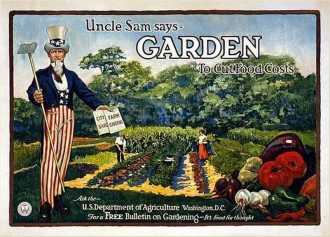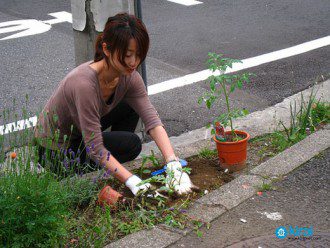Contributing writer for Wake Up World
During both world wars, Victory Gardens were a staple throughout the United States, found everywhere from private residences to public lands and even the front lawns of city hall. Their purpose was simple: to reduce pressure from the public food supply during times of war. Victory Gardens also carried an unexpected perk, they helped boost morale during uncertain times by empowering gardeners through their contribution of labor and production of sorely needed fresh fruits and vegetables. Incredibly, these seemingly humble vegetable patches produced a staggering 41% of all fruits and vegetables consumed by the nation.
Jump to the present day and our system of food production would be all but unrecognizable to Victory Garden veterans. Instead of food self-sufficiency, we have homeowners persecuted for growing produce on their own property and children who think food comes packaged from the supermarket. Small farms are going bankrupt and being assimilated into industrial corporate farming operations. And when individuals push back against the hijacking of our food supply, they are met with fierce opposition, often stemming from local government.
No one knows this unfortunate reality better than Hermine Ricketts and Tom Carroll, who faced fines of $50/day for growing vegetables in their front yard.
Plastic flamingos, no problem — but forget about growing vegetables
The South Florida couple are old hands at growing vegetables, seventeen years to be exact. Hermine and Tom haven’t haven’t had any complaints about their front yard garden for almost two decades, yet suddenly, neighborhood officials decided that a self-sufficient lifestyle is unappealing in Miami Shores. They were given a choice: either they rip out the garden, or face fines of $50 a day due to violations in zoning ordinances.
“The Village Code, for decades, has permitted vegetable gardens in our residents’ backyards, but for aesthetic purposes and otherwise, vegetable gardens are not permissible in the front yards,” said officials.
Hermine’s garden — with it’s okra, kale, lettuce, onions and a range of Asian cabbages — was once her pride and joy. Now, after being forced to remove the garden, she’s already feeling the financial squeeze of overpriced organic vegetables in the market.
Most would agree the logic behind the village ordinance is downright exasperating. Even Joey Flechas of the Miami Herald quips: “The Miami Shores ordinance specifically bans vegetables. Fruits, flowers, garden gnomes and plastic flamingoes are fine.”
According to Ari Bargil, the couple’s attorney, the village’s zoning code violates several of Florida’s homeowners’ inalienable rights, such as the right to “acquire, possess and protect property.”
“The right to grow and harvest your own food on your very own property is certainly part of that right to acquire, possess and protect property,” emphasizes Bargil.
Sadly, this isn’t an isolated incidence. If anything, we’re seeing increased oppression. Below are just a few examples of how local governments can throw a wrench into the best laid plans of those who want to lead more self-sufficient lives.
August 2011: Denise Morrison’s Tulsa, Oklahoma’s front garden was once lush with flowers in bloom, lemon, stevia, strawberries, mint and several fruit trees — including apple, walnut, pecan and more. That all changed when the city claimed it had a complaint about the yard. After having her court date about the garden delayed by a judge, city workers took it upon themselves to cut down a majority of the plants, as well as some of the trees — without waiting for a fair hearing.
September 2011: Memphis high school teacher Adam Guerrero was ordered to dismantle a vegetable garden in his front yard used to educate students about growing food and becoming more self-sufficient.
June 2012: Karl Tricamo of Ferguson, Missouri was told he needed to remove his front yard vegetable garden, even though it didn’t violate any zoning ordinance. He took the city to court — and eventually won — but it was a long, uphill battle.
October 2012: An Orlando, Florida family received a notice stating, “Front yard must be restored to its original configuration and ground covers restored.” In other words, their front yard vegetable garden was deemed unacceptable by the city. Only lawn and ornamental plants are considered appropriate.
But it’s not all doom and gloom on the self-sufficiency front. A small green uprising is taking place in the most unlikely of locations: South Central Los Angeles.
Don’t Ask, Just Plant. How “Guerrilla Gardening” can save the day
Famed “Guerrilla Gardener” Ron Finley decided to turn his South Central L.A. neighborhood from a food desert into an oasis of organic fruits and vegetables that everyone could enjoy. He began with planting giant sunflowers — along with kale and pomegranates — in a 10-foot-wide by 150-foot-long parkway in front of his house — essentially a small patch of dirt between the curb and the sidewalk. Before long, the garden was in full bloom, attracting not only people from the neighborhood, but beneficial insects too.
Soon, a group formed that began planting gardens around the neighborhood and in peoples yards for free. All was humming happily along until Ron received a citation ordering him to remove his parkway plot vegetation or purchase a $400 permit. He ignored it and the citation morphed into a warrant. “I got an arrest warrant for beautifying my street—a warrant for planting a carrot!” he said.
Ron wasn’t about to backdown, especially over some “… stupid, antiquated law that needs to be changed.” There wasn’t any healthy food in the area — and those dirt plot parkways were the only place where people could grow food. Not to mention that no one was being given citations for all the old discarded toilets, couches and used condoms on the street — only those who were bringing nature, beauty and a sense of peace and calm to the neighborhood were being harassed.
As luck would have it, LA Times columnist Steve Lopez wrote about the garden. And a petition was started in support of Ron’s plantings. Next, Councilman Herb Wesson took an interest and by 2013, the L.A. City Council voted to change the law, where it is now legal to grow food within your parkway. And Ron Finley was never arrested.
In spite of past challenges, word is getting out. People across the city (and around the world) are planting away — at home, school and work. To the delight of all, vegetable gardens are popping up in the most surprising places.
The Guerrilla Gardener is currently working on generating funds for the Ron Finley Project, which plans to purchase an acre of land in South Central L.A. behind the city’s oldest operating library and transform it into an urban garden haven. When finished, it will include a greenhouse, a café made from a shipping container, and a community garden — the last aspect is where people can grow, exchange and sell their food at a bi-weekly farmers stand on the property. Gardening and art classes will be offered as well, along with a program to show people how to use the thousands of pounds of fruit from yards that usually go to waste each year.
When all is said and done, Ron ultimately believes:
“If you want something changed, you have to stop waiting for someone else to do it. You are the change! This is your canvas, you should paint it. Your health, and the health of your community, is your responsibility and no one else’s. Once we’re done transforming South Central L.A., the next move is to transform the world.”
Ron Finley: A guerilla gardener in South Central LA
Article sources
- www.futurefarmers.com/victorygardens/history.html
- www.miamiherald.com/news/local/community/article1957613.html
- www.change.org/p/government-stop-arresting-people-for-growing-their-own-garden
- www.newson6.com/story/18802728/woman-sues-city-of-tulsa-for-cutting-down-her-edible-garden
- www.fortune.com/2015/02/25/they-tried-to-arrest-me-for-planting-carrots
- www.ronfinley.com/the-ron-finley-project
About the author:
 Carolanne Wright enthusiastically believes if we want to see change in the world, we need to be the change. As a nutritionist, natural foods chef and wellness coach, Carolanne has encouraged others to embrace a healthy lifestyle of organic living, gratefulness and joyful orientation for over 13 years.
Carolanne Wright enthusiastically believes if we want to see change in the world, we need to be the change. As a nutritionist, natural foods chef and wellness coach, Carolanne has encouraged others to embrace a healthy lifestyle of organic living, gratefulness and joyful orientation for over 13 years.
Through her website Thrive-Living.net, she looks forward to connecting with other like-minded people from around the world who share a similar vision. You can also follow Carolanne on Facebook, Twitter and Pinterest.
Further reading from Carolanne Wright:
- Plastic Waste in the Ocean Will Outnumber Fish by 2050
- Seed Bombs: A Creative (and Fun) Mission to Save the Bees and Butterflies
- Autistic Boy with Higher IQ Than Einstein Discovers Gift After Removal from State-Run Therapy
- Monsanto Charged with Crimes Against Nature and Humanity – Set to Stand Trial in 2016
- Plastic-Eating Mushroom Discovered in the Amazon Rainforest — A Solution for Our Trash Saturated World?
- Big Pharma and Organized Crime — They are More Similar Than You May Think
- Over 100 Scientific Studies Agree: Cannabis Annihilates Cancer
- Emotional Energetic Healing: The Future of Medicine is Here
- Why Every Parent Should Consider Unschooling
- First U.S. City Produces More Electricity Than It Uses — With 100% Renewable Technology

If you've ever found value in our articles, we'd greatly appreciate your support by purchasing Mindful Meditation Techniques for Kids - A Practical Guide for Adults to Empower Kids with the Gift of Inner Peace and Resilience for Life.
In the spirit of mindfulness, we encourage you to choose the paperback version. Delve into its pages away from screen glare and notifications, allowing yourself to fully immerse in the transformative practices within. The physical book enriches the learning process and serves as a tangible commitment to mindfulness, easily shared among family and friends.
Over the past few years, Wake Up World has faced significant online censorship, impacting our financial ability to stay online. Instead of soliciting donations, we're exploring win-win solutions with our readers to remain financially viable. Moving into book publishing, we hope to secure ongoing funds to continue our mission. With over 8,500 articles published in the past 13 years, we are committed to keeping our content free and accessible to everyone, without resorting to a paywall.









